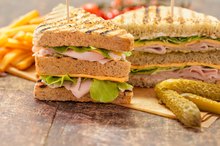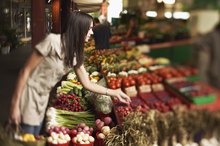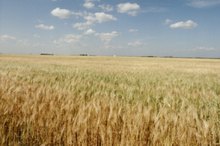An ileostomy is an opening in the abdominal wall where waste products can exit the body. Part of the intestine is attached to the opening. The waste goes into a pouch that in attached to the ileostomy; you change this pouch regularly. You may need an ileostomy after an injury or surgery like colon cancer resection or inflammatory bowel disease surgery involving the colon or rectum. Having an ileostomy may mean that you will have to make some adjustments to your diet, but you still should be able to enjoy your meals and eating.
Be Selective of Fruits and Vegetables
Eating fruits and vegetables are important for good health; however, you may need to change your choices. Fruits and vegetables with skins and seeds may be difficult to digest and may cause irritation of your digestive tract leading to diarrhea, according to the University of Pittsburgh Medical Center 12. Fruits that are good choices include applesauce, cooked or canned fruits, pureed fruits, ripe bananas and all fruit juices except prune.
Eat Well-cooked Meats and Eggs
How to Gain Weight After a Colostomy
Learn More
Tough undercooked meats may also be difficult to digest and fried foods may cause loose stools. Highly seasoned meats, poultry and fish as well as luncheon meats should also be avoided.
Choose Starches Made from Refined Flour
Breads and pasta made from refined flour contain less fiber and are better choices for you if you have an ileostomy. Breads that contain additional nuts, seeds or coconut should be avoided as well, according to the American Society for Parenteral & Enteral Nutrition 3.
Drink Plenty of Liquids
A Diverticulitis Diet Without Wheat
Learn More
Since you have an ileostomy you may lose more fluids than a person without one, as most of the fluid in the body is reabsorbed during digestion in the large intestine. You will have to drink more fluids to avoid dehydration. Drink six to eight cups of fluids each day; tea, coffee and carbonated beverages are all acceptable, as are most fruit and vegetable juices. Ask your dietitian if prune juice or other juices should be avoided.
- Since you have an ileostomy you may lose more fluids than a person without one, as most of the fluid in the body is reabsorbed during digestion in the large intestine.
Avoid Foods that May Cause a Blockage
Certain foods – especially if not digested well – may cause a blockage at the opening of your ileostomy. Examples include:
- celery
- popcorn
- nuts
- seeds
- peas
- coleslaw
- raisins
- according to University of Pittsburgh Medical Center 12
Although you should limit your intake of these foods to avoid problems, you do not have to totally avoid eating any of them if you eat small amounts and make sure that you chew them completely.
Experimentation Is Important
Everyone does not react the same to all foods; some foods may cause diarrhea or gas in one person but not in another. You may find that you may be willing to experience a bit of discomfort or inconvenience after eating a specific food if you are going to be at home alone. Spend some time experimenting and trying new foods to see how you react to each. Your physician and dietitian can help you make some decisions as well. Having an ileostomy does not mean that your life comes to an end. You can still eat a broad, tasty diet and enjoy meals with your friends.
- Everyone does not react the same to all foods; some foods may cause diarrhea or gas in one person but not in another.
- You may find that you may be willing to experience a bit of discomfort or inconvenience after eating a specific food if you are going to be at home alone.
Related Articles
References
- University of Pittsburgh Medical Center: Ostomy Nutrition Guide
- University of Pittsburgh Medical Center: Ileostomy Care
- American Society for Parenteral & Enteral Nutrition: Ileostomy Diet
- American Cancer Society. "Ileostomy." Cancer.org 17 Mar 2011.
- NHS Choices. "Ileostomy." National Health Service 3 Sept 2012.
- United Ostomy Associations of America, Inc. "Ileostomy Guide." Ostomy.org 2011.
Resources
Writer Bio
Dominique Brooks has been a medical editor for over 10 years. She has worked in medical education for physicians, nurses and pharmacists as well as consumers. She started writing business articles for Work.com in 2008 and health articles online in 2009. She holds a Master of Business Administration from the University of Alabama and a Doctor of Medicine from Vanderbilt University.








